- Home
- Jack Higgins
Dark Side Of The Street Page 8
Dark Side Of The Street Read online
Page 8
“Good lass, Molly,” Crowther said. “You go in and make ”em some ham and eggs.“
The girl moved off without a word and Crowther turned with a big smile, holding out his hand. “Mr. Youngblood and Mr. Drummond, I presume. There was so much about you two on the eleven o’clock news that I feel I’ve known you all my life. I’m Sam Crowther.”
Youngblood ignored the hand. “And what’s that?” He nodded to Billy who had just shambled out of the shadows of the barn.
“Only Billy, Mr. Youngblood. Only Billy.” Crowther chuckled and tapped his forehead significantly. “He’s not got all he needs upstairs, but he’s as good as two ordinary men round the farm. But what are we standing round here for? You come on in and I’ll show you your room. By the time you’ve washed up Molly will have a meal on the table, I’ve no doubt.”
“Your daughter?” Chavasse said as they went into the porch.
“That’s it, Mr. Drurnmond. A good girl, our Molly.”
“She doesn’t seem to have much to say for herself.”
“Not so surprising,” Crowther said piously. “And her mother barely twenty-four hours cold.” There was a door to the left and he opened it to disclose a cheap deal coffin with gilt handles standing on a table. “We’re putting her under at the village church at ten o’clock in the morning. It’s eight miles away so that means the hearse will be here at nine. You gentlemen will have to lay low till it’s gone.”
He closed the door and led the way up a flight of narrow wooden stairs covered in cheap linoleum worn smooth by the years. The landing was long and narrow and he opened the door at the far end and switched on the light.
“I think you’ll be comfortable enough here.”
There was an old double bed with a brass frame, a wardrobe and dressing table in Victorian mahogany and a marble washstand.
Youngblood unbuttoned his raincoat and threw it on the bed. “And how long do we stay here?!
“Until I get the right telephone call. Could be tomorrow. The day after at the latest. But don’t worry. You’re safe enough here. We’re miles from anywhere.”
“And where exactly would that be?” Chavasse asked.
Crowther gave him a sly grin. “That would be telling, now wouldn’t it, Mr. Drummond? No, I couldn’t do that. I’ve got myself to protect. You gents come down when you’re ready. There’ll be food on the table.”
The door closed behind him and Youngblood took off his jacket and draped it over a chair. “What do you think?”
“I wouldn’t trust him out of my sight for very long.” Chavasse moved to the window and peered outside. “This place is like a bad film set for Wuthering Heights.”
Youngblood poured water from a large jug into a cracked basin and swilled his face and neck. “I know one thing,” he said as he toweled himself briskly. “He only has to make one wrong move and I’ll break his bloody neck.”
Chavasse took off his raincoat and moved across to the basin. “I’ve a feeling that might not be so easy where our boy Billy’s concerned.”
“You’ve got a point there, but why cross bridges?” Youngblood grinned. “Right now I’m more interested in ham and eggs. I’ll see you downstairs.”
The door closed softly behind him and Chavasse stood frowning “into the cracked mirror above the washstand. There was something wrong here, he had never been more certain of anything in his life. It spoke aloud in the girl’s silence, in the slyness in Crowther’s eyes when he glanced sideways, in the great shambling imbecile that was his shadow. But if something sinister was intended, what could it be? Crowther was no fool, that was obvious and must realise that together, Chavasse and Young-blood presented a formidable combination. Separated on the other hand… With a sudden exclamation, he hurled the rowel from him, wrenched open the door and hurried downstairs.
==========
When Youngblood went into the parlour there was no one there and he moved along the passage and entered the kitchen. Molly was standing at the stove in an old cotton dress that was a size too small so that the skirt seams had split in several places. She wore no stockings and when she turned to look at him he realised, with considerable disappointment, that the moon had lied. She was at best plain and with her high cheekbones, olive skin and overfull lips, many people would have considered her ugly, ”It’s almost ready,“ she said in that strange, dead voice of hers and smoothed her hands over her thighs. ”I’m just going out to the shed to get some more wood for the stove.“
She took a lantern down from a hook above the sink, lit it and moved towards the back door. Youngblood was there before her. “Here, I’ll take that,” he said. “You could probably do with some help.”
She hesitated, gazing up at him, a strange uncertain expression in her eyes and then she handed him the lamp. “All right. It’s across the yard.”
The cobbles were damp in the night air and treacherous underfoot and Youngblood picked his way carefully, cursing when he stepped into a puddle and water slopped into one of his shoes. When the girl opened the door of the shed, he could smell mouldy hay, old leather and wood shavings and damp where the stars gleamed through a hole in the roof.
“Over here,” she said.
He went towards her, lantern raised and paused. A trick of the lamplight, he knew that, but for a moment she looked exactly as she had done down there on the road in the moonlight—as old as Eve and more beautiful than he had thought any woman could be.
She turned, leaning over the woodpile, one knee forward so that the old cotton dress tightened across her thighs like a second skin.
Five years. Five long years. Youngblood moved forward, reaching out to touch and she turned to face him. It was there in her eyes, the sudden shock, the knowing. For a moment they stayed that way and then she seemed to sway towards him.
From somewhere in the house Chavasse called, “Harry, where are you?”
Youngblood smiled, reached forward and gently stroked her face with the back of one hand. “Some other time perhaps? You take the lantern. I’ll carry the wood.”
She moved back clutching the lantern in both hands, the knuckles gleaming white, betraying her inner tension. Youngblood piled half a dozen logs in the crook of one arm and led the way out.
As they crossed the yard Chavasse appeared in the kitchen doorway. “So there you are? There didn’t seem to be anyone around. I got worried.”
“Just helping with the chores.” Youngblood turned to Molly. “Where’s your father got to?”
“Here I am, Mr. Youngblood.” Crowther moved out of the shadows on the other side of the yard. “Just settling the animals.”
“Where’s Billy?”
“Never you mind about him. He sleeps in the barn. Best place for him. Are we all ready then?” He turned to the girl, rubbing his hands together and said jovially, “By gum, I don’t know what you’ve got for us, lass, but I could eat a horse.”
==========
It was a good hour later when Billy shambled out of the darkness across the yard and approached the rear door. He opened it carefully and moved inside.
Crowther was sitting at the kitchen table smoking his pipe and reading a newspaper. He looked up and nodded calmly. “There you are then, Billy.”
He went to a cupboard under the sink and came back with a ten-pound hammer. “You know what to do?”
Billy gripped the hammer tightly in his right hand and nodded eagerly, saliva glistened on his chin.
“Good lad. Best get started then.”
Crowther opened the door, led the way along the passageway and mounted the stairs to the landing. He paused outside the end door, a finger on his lips and tried the knob gently. The door remained immovable and he turned calmly and pushed Billy back along the corridor.
At the bottom of the steps he paused and put a hand on the big man’s shoulders. “Never mind, Billy, there’s always tomorrow,” he said.
==========
In the bedroom, Chavasse and Youngblood stood in silence watching
the door knob turn. When the soft footsteps had faded along the passageway, Youngblood’s breath left his body in a long sigh.
“My God, I’m glad you’re here,” he said to Chavasse. “I feel like a ten-year-old kid that’s looking for a bogie in every cupboard.”
“In this house you’d probably find one. Still, there’s one good thing.”
“What’s that?”
Chavasse grinned. “It’s nice to know I’m wanted.”
7. Something Nasty in the Woodshed
RAIN DRIFTED AGAINST the window with the dismal pattering and Chavasse looked out across the farmyard morosely. In the grey light of early morning, it presented an unlovely picture. Great potholes in the cobbles filled with stagnant water, archaic, rusting machinery and a profusion of rubbish everywhere.
“Have you ever seen anything like it?” Young-blood asked in disgust. “Talk about Cannery Row.”
Chavasse went to the table and poured himself another cup of tea. “What time is it?”
“Just coming up to nine forty-five.”
“And Crowther said the funeral was at ten. They should be back here by half past.” He nodded at the table. “Had enough to eat?”
“Yes—you fry a good egg.”
Chavasse opened the kitchen door and looked up at the hill on the other side of the yard. There was a small grey stone hut on top and a scattering of grimy looking sheep.
“Think I’ll take a walk—see what I can see.”
Youngblood looked out over his shoulder at the rain. “Rather you than me. I’ll search the house. There might be a gun around the place.”
“You’ll be lucky,” Chavasse said. “Crowther may be primitive, but he has all the cunning of the fox.”
He took an old oilskin coat down from behind the door and went outside, buttoning it up to his chin. There was a pile of rusting tin cans against the outhouse wall, the accumulation of the years, and he kicked one of them across the yard and followed it into the barn.
It was in the same state of decay as the rest of the place, planks missing from the door, rain drifting down through several holes in the roof. An old cattle truck which still seemed to be in working order was parked by the rear door and the tractor beside it, its metal parts red with rust in the damp atmosphere, looked as if it hadn’t functioned for years.
Chavasse kicked the tin can carelessly out of his path. It landed in a pile of mouldy hay in one corner and a couple of brown rats shot into the open to poise in the centre of the floor watching him. Strange how you could never get over some things. His face wrinkled in disgust and he picked up a stone and threw it with all his force, sending them running for the shadows on the other side of the barn.
He went out through the other door, passed through a wilderness of brambles and nettles that had once been a kitchen garden and found the beginnings of a path beyond the crumbling boundary wall.
It lifted through a scattering of alder trees, following the curve of the hillside, climbing steeply to the summit. Quite suddenly he found that he was enjoying himself. There was a fine fresh smell to the rain and the hard physical exercise was something to be enjoyed for its own sake after the long weary months of prison life.
He negotiated a high drystone wall by climbing an ingenious stone stile and found himself on the final slope. Sheep wandered amongst a jumble of great boulders and outcrops of stone, carved by the winds of time into a thousand strange shapes. Above him to the rear of the hut, a clump of thorn trees stood together, their branches twisted and unnatural and pointing, like the fingers of a gnarled hand, in the same direction, forced by the prevailing wind.
The hut was larger than it had looked from the farmyard and in reasonable condition. There was fresh hay inside, dry and sweet and sacks of feedstuffs, probably for the sheep. He lit a cigarette, went back outside again, and crossed to the scattering of rocks that formed the spine of the hill.
From there he had a clear view of the main road in the valley below shrouded in mist, a gleam of water beyond. A reservoir, perhaps a lake? He turned away and with something of a shock, found that Molly Crowther was standing watching him.
She made a strange melancholy figure, fitting perfectly into that dead landscape in an old black coat with the padded shoulders fashionable during the war years. A scarf was bound tightly around the strong peasant face.
“Hello there,” Chavasse said, walking to meet her. “Did everything go all right?”
She nodded with a curious indifference. “The priest didn’t waste much time. He was getting wet.”
“Where’s your father?”
“Gone into the next village with Billy. He dropped me down there on the road. It’s quicker to walk over the hill and I wanted to check on the sheep.”
“Do you look after them?”
“Most of the time. Billy helps me when he’s in the mood. The trouble is he doesn’t know his own strength. One minute he’s fondling a lamb, the next its neck is broken. He isn’t very reliable.”
“I see your point.” Chavasse hesitated and went on, “I’m sorry about your mother.”
“I’m not,” she said with brutal frankness. “She had cancer of the stomach during the last year of her life and refused to go to hospital. I had to look after her. It wasn’t much of a time for either 01 us. She’s well out of this place anyway.”
“Don’t you like it here?”
She turned on him in surprise. “Who could like a place like this?” She flung out an arm that seemed to embrace the whole wind-swept landscape. “Even the trees grow crooked here. It’s a dead world. I sometimes think the only living things in it are the sheep and they’re like Billy—witless.”
“Why don’t you leave?”
“I couldn’t before—there was my mother to consider. Now it’s too late. I’m squeezed dry. I wouldn’t know where to go.”
There was real pain in her voice and Chavasse felt genuinely sorry for her. “Perhaps your father could help. He may intend to now that your mother has gone.”
“There’s only one thing he wants to do for me—God knows he’s tried that often enough.” She laughed harshly. “My father died when I was three. He was a gypsy like my mother. She met Sam Crowther at Skipton Market ten years ago and married him within a week. The worst day’s work she ever did in her life.”
“You sound as if you hate him.”
“And this place—all I ever wanted was to get away.”
“Where would you like to go?”
“I’ve never really thought about it.” She shrugged. “Some place where I could get a decent job, wear nice clothes, meet people—London, maybe.”
From her vantage point it must have seemed as remote as the moon and just about as romantic. “Distance lends enchantment,” he told her gently. “London can be the loneliest place on earth.”
“I’d take my chances.” They had reached one of the boundary walls and she leaned against it, arms folded under her breasts. “It must be marvelous to be able to go places—do exciting things—like Mr. Youngblood, for instance.”
“Five years in gaol,” Chavasse said. “Another fifteen to go if they catch him—perhaps more now. Nothing very romantic there.”
“I mean before that,” she said with a slight trace of impatience. “He was a smuggler, you know.”
“Amongst other things.”
She rushed on, looking animated for the first time since he had known her. “I read an article about him in one of the Sunday papers last year. They said he was a modern Robin Hood.”
“I suppose that’s one way of looking at it. Depends what the original was like.”
“But it’s true,” she insisted. “They published an interview with an old lady who’d been treated with eviction because she couldn’t pay her rent. Somebody told Mr. Youngblood. He gave her a hundred pounds and he’d never even met her before.”
Chavasse could have told her that the incident had taken place just after a successful payroll snatch in Essex which was known to have nette
d Youngblood and his associates thirty-two thousand pounds and had put two armoured car guards in hospital, one with a fractured skull, but he knew when he was wasting his time.
He grinned crookedly. “He’s certainly quite a man.”
She nodded. “I hope he gets away, clear out of the country. I hope you both do.”
“Do you get many people through here like us?” he said.
“About half a dozen this year.”
“What about George Saxton and Ben Hoffa, Harry’s friends? Did you see anything of them?”
Suddenly it was as if shutters had dropped squarely into place and when she glanced at him, the eyes were blank, the face devoid of all expression. “Yes, they were here.”
“For how long?”
She hesitated and then said slowly, “I don’t know. I didn’t see them go.”
Chavasse was aware of a sudden coldness in the pit of the stomach and his throat seemed to go dry. “Was that unusual?”
“Yes—yes, it was,” she said hesitatingly. “The others were here for two or three days. I always saw them leave. My step-father took them in the car.“
“Let me get this straight,” Chavasse said. “You met Saxton and Hoffa down there on the road at night just like us and you brought them up to the farm?”
“That’s right.”
“Did you ever see either of them again after that?”
“Never.”
They stood staring at each other dumbly in the rain, the ceaseless sighing of the wind the only sound.
“What happened to them, Molly?” Chavasse said.
“I don’t know. Before God, I don’t know,” she cried.
“You mean you don’t want to know, don’t you?”
She shuddered violently as if at some secret unpleasant thought and he gripped her arms above the elbows, gentling her like a fractious mare. “All right, Molly—there’s nothing to worry about. I’ll handle it.”
He started to walk away, paused and turned towards her. “Are you coming down?”
“I’ve the sheep to see to.” Her hands were shaking so hard that she had to clasp them together. “Later—I’ll be along later.”

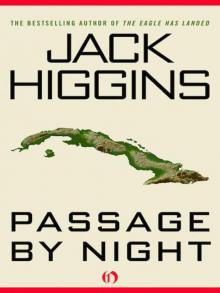 Passage by Night (v5)
Passage by Night (v5)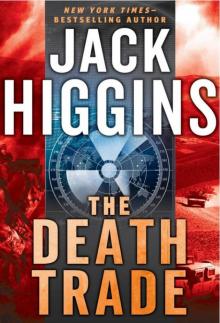 The Death Trade sd-20
The Death Trade sd-20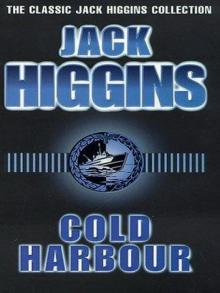 Cold Harbour
Cold Harbour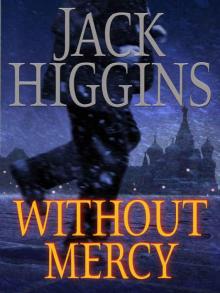 Without Mercy
Without Mercy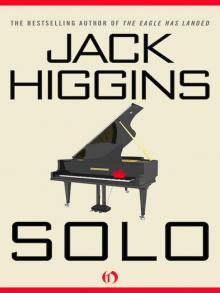 Solo (Aka the Cretan Lover)(1980)
Solo (Aka the Cretan Lover)(1980) First Strike
First Strike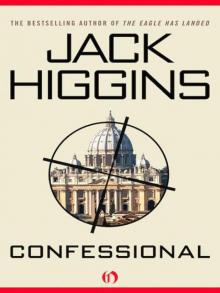 Confessional - Devlin 03 (v5)
Confessional - Devlin 03 (v5)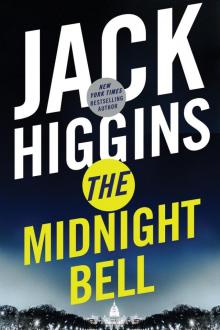 The Midnight Bell
The Midnight Bell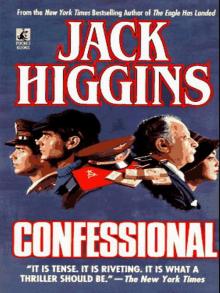 Confessional
Confessional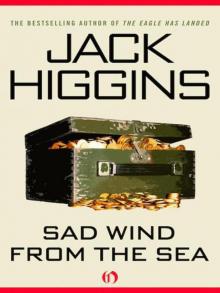 Sad Wind from the Sea (v5)
Sad Wind from the Sea (v5)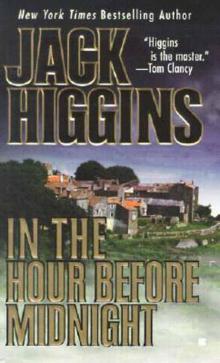 In The Hour Before Midnight aka The Sicilian Heritage
In The Hour Before Midnight aka The Sicilian Heritage Wrath of the Lion
Wrath of the Lion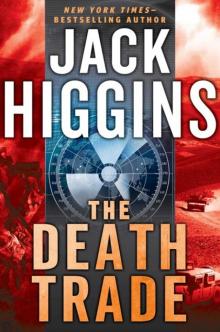 SDillon 20 - The Death Trade
SDillon 20 - The Death Trade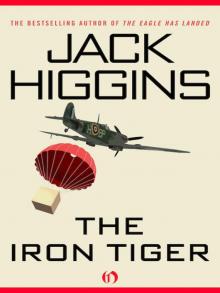 the Iron Tiger (1974)
the Iron Tiger (1974)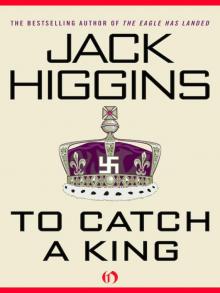 To Catch a King
To Catch a King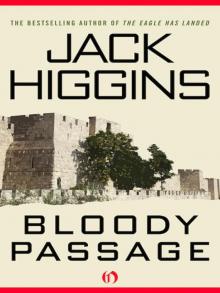 Bloody Passage (1999)
Bloody Passage (1999) Wrath of the Lion sd-8
Wrath of the Lion sd-8 Sharp Shot
Sharp Shot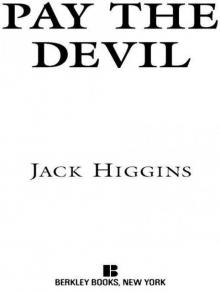 Pay the Devil (v5)
Pay the Devil (v5) A Devil Is Waiting
A Devil Is Waiting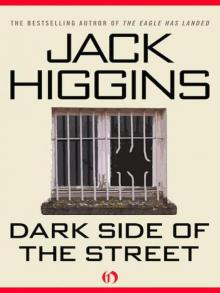 Dark Side of the Street - Simon Vaughn 01 (v5)
Dark Side of the Street - Simon Vaughn 01 (v5)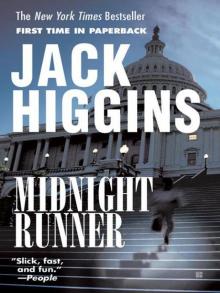 Midnight Runner - Sean Dillon 10
Midnight Runner - Sean Dillon 10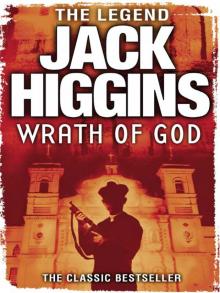 Wrath of God
Wrath of God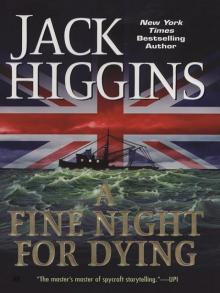 A Fine Night for Dying
A Fine Night for Dying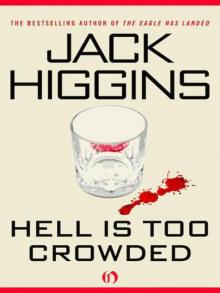 Hell Is Too Crowded v5)
Hell Is Too Crowded v5)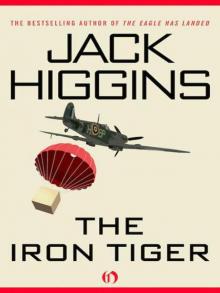 the Iron Tiger (v5)
the Iron Tiger (v5)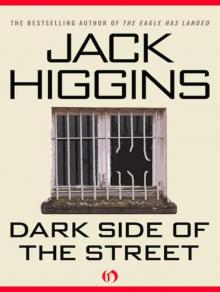 Dark Side of the Street pc-5
Dark Side of the Street pc-5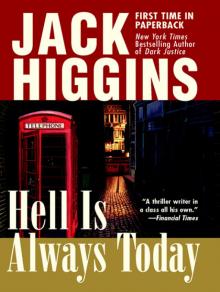 Hell Is Always Today
Hell Is Always Today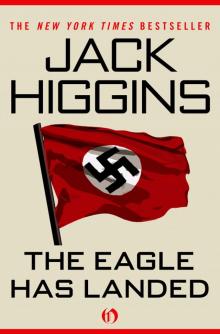 Eagle Has Landed
Eagle Has Landed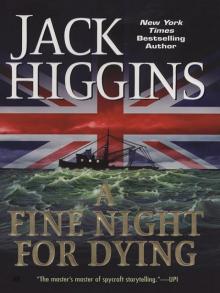 A Fine Night for Dying pc-6
A Fine Night for Dying pc-6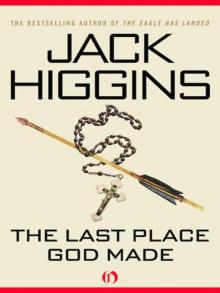 the Last Place God Made (v5)
the Last Place God Made (v5)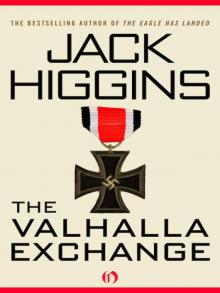 the Valhalla Exchange (1976)
the Valhalla Exchange (1976)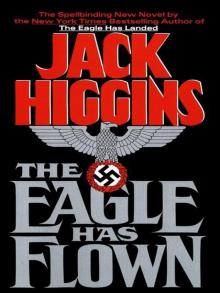 The Eagle Has Flown
The Eagle Has Flown Sure Fire
Sure Fire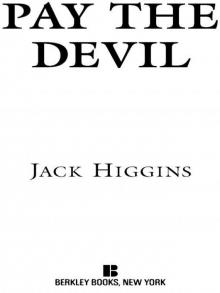 Pay the Devil (1999)
Pay the Devil (1999)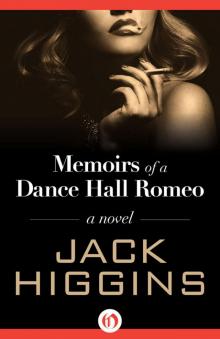 Memoirs of a Dance Hall Romeo
Memoirs of a Dance Hall Romeo![a Prayer for the Dying (1974)[1] Read online](http://i1.bookreadfree.com/i1/04/02/a_prayer_for_the_dying_19741_preview.jpg) a Prayer for the Dying (1974)[1]
a Prayer for the Dying (1974)[1]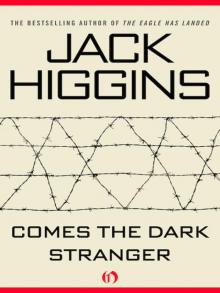 Comes the Dark Stranger
Comes the Dark Stranger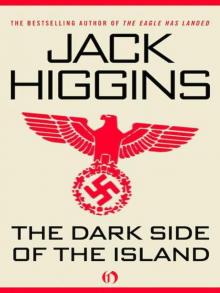 Dark Side Of the Island (v5)
Dark Side Of the Island (v5)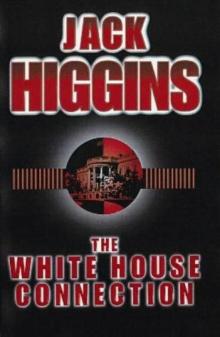 The White House Connection sd-7
The White House Connection sd-7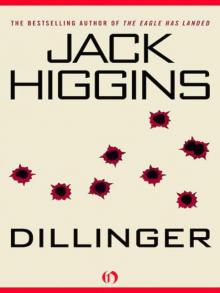 Dillinger (v5)
Dillinger (v5) Eye of the Storm
Eye of the Storm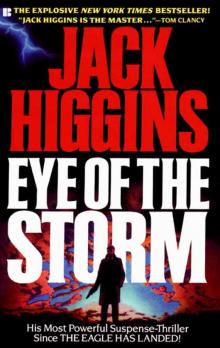 Eye Of The Storm aka Midnight Man
Eye Of The Storm aka Midnight Man A Darker Place
A Darker Place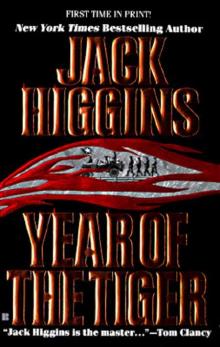 Year Of The Tiger
Year Of The Tiger Death Run
Death Run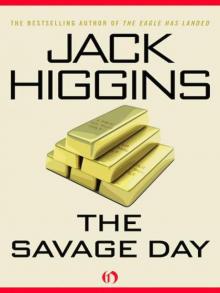 the Savage Day - Simon Vaughn 02 (v5)
the Savage Day - Simon Vaughn 02 (v5)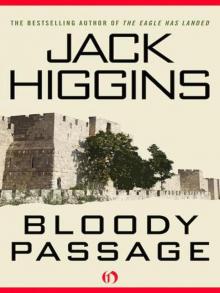 Bloody Passage (v5)
Bloody Passage (v5)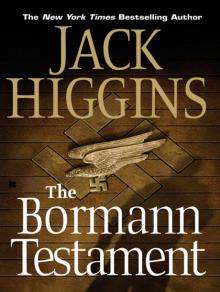 The Bormann Testament
The Bormann Testament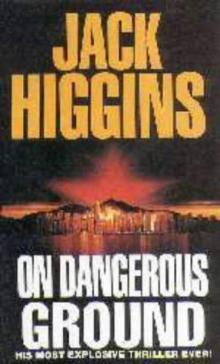 On dangerous ground sd-3
On dangerous ground sd-3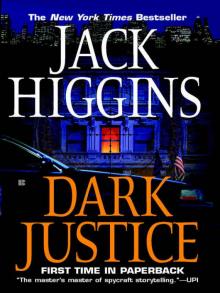 Dark Justice
Dark Justice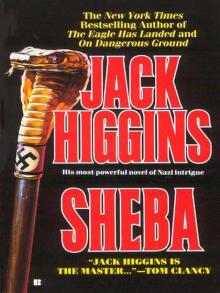 Sheba
Sheba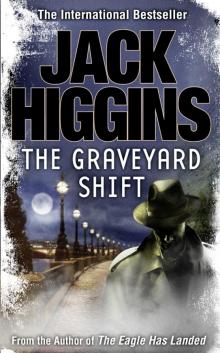 The Graveyard Shift
The Graveyard Shift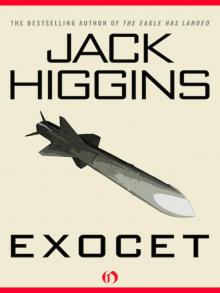 Exocet (1983)
Exocet (1983)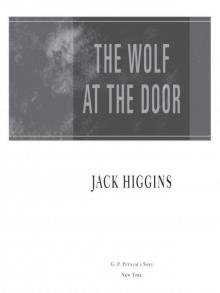 The Wolf at the Door
The Wolf at the Door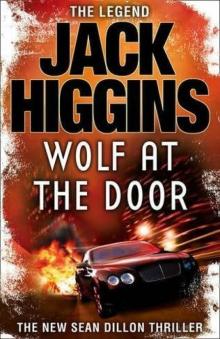 The wolf at the door sd-17
The wolf at the door sd-17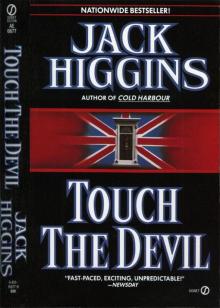 Touch The Devil
Touch The Devil The President’s Daughter
The President’s Daughter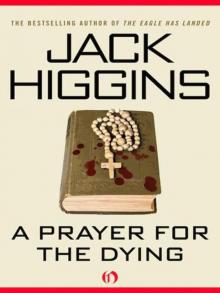 A Prayer for the Dying (v5)
A Prayer for the Dying (v5)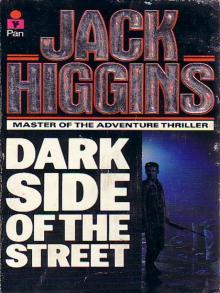 Dark Side Of The Street
Dark Side Of The Street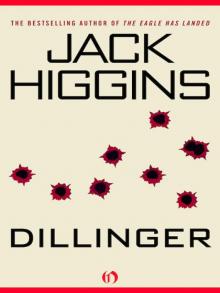 Dillinger (1983)
Dillinger (1983)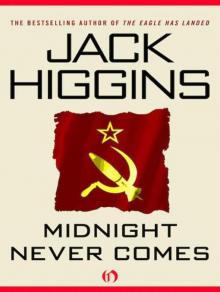 Midnight Never Comes pc-4
Midnight Never Comes pc-4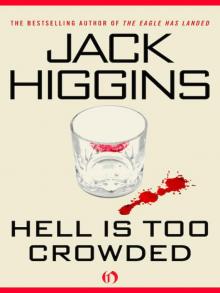 Hell Is Too Crowded (1991)
Hell Is Too Crowded (1991)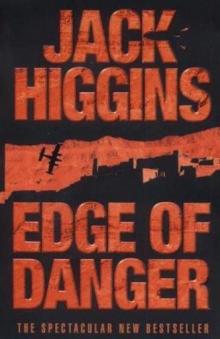 Edge of Danger sd-9
Edge of Danger sd-9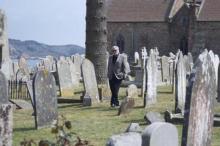 The Thousand Faces of Night (v5)
The Thousand Faces of Night (v5)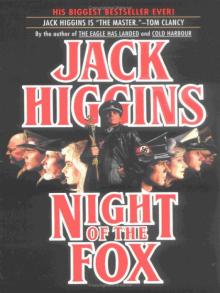 Night Of The Fox
Night Of The Fox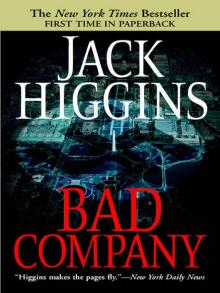 Bad Company
Bad Company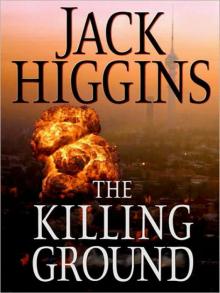 The Killing Ground
The Killing Ground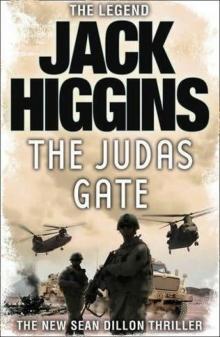 The Judas gate sd-18
The Judas gate sd-18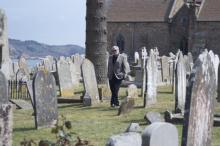 The Thousand Faces of Night (1961)
The Thousand Faces of Night (1961)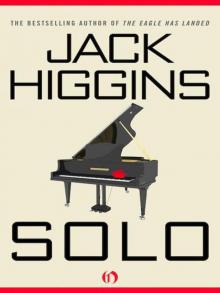 Solo (Aka the Cretan Lover) (v5)
Solo (Aka the Cretan Lover) (v5)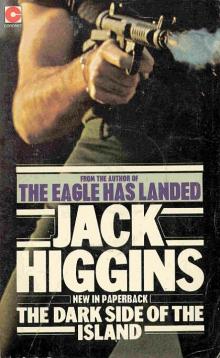 The Dark Side Of The Island
The Dark Side Of The Island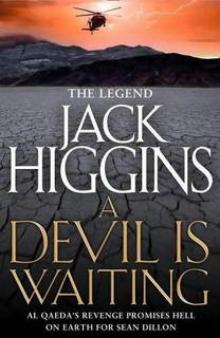 A Devil is vaiting sd-19
A Devil is vaiting sd-19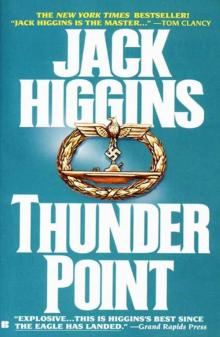 Thunder Point
Thunder Point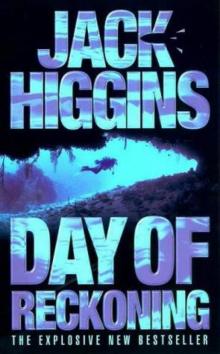 Day of Reckoning sd-8
Day of Reckoning sd-8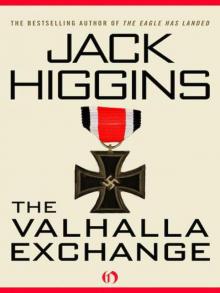 the Valhalla Exchange (v5)
the Valhalla Exchange (v5)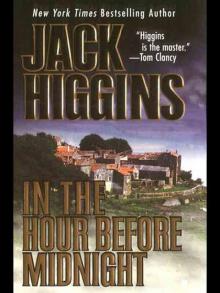 In the Hour Before Midnight
In the Hour Before Midnight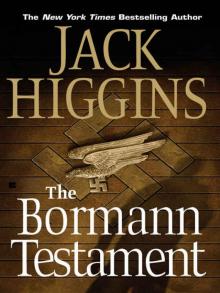 The Bormann Testament (The Testament of Caspar Schultz)
The Bormann Testament (The Testament of Caspar Schultz) The Judas Gate
The Judas Gate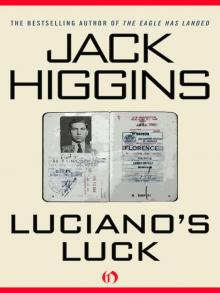 Luciano's Luck
Luciano's Luck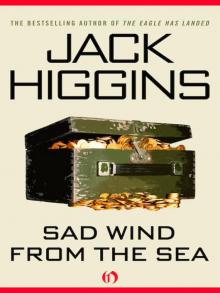 Sad Wind from the Sea (1959)
Sad Wind from the Sea (1959)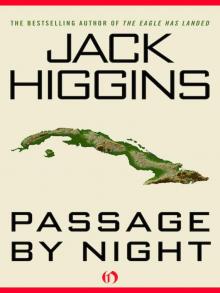 Passage by Night (1987)
Passage by Night (1987)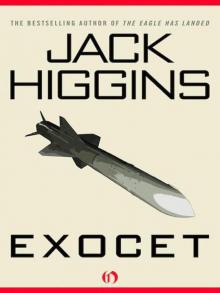 Exocet (v5)
Exocet (v5)